MercoPress. South Atlantic News Agency
Tag: Nicolas Maduro
-
Wednesday, April 10th 2019 - 09:57 UTC
Bolsonaro reveals Brazil is working with the US to sow dissent in Venezuelan army

Brazilian President Jair Bolsonaro said on Monday he is working with the US government to sow dissent within the Venezuelan army. Bolsonaro, during an interview with Jovem Pan radio, and added if there is a military invasion in Venezuela, he would ask to seek the counsel of Brazil's National Defense Council and Congress on what, if any, action his country should take.
-
Tuesday, April 9th 2019 - 07:29 UTC
Venezuela pledges to fulfill its commitments to Cuba despite US sanctions
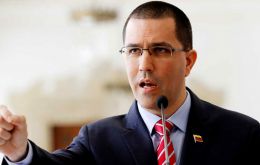
Venezuela will “fulfill its commitments” to Cuba despite United States sanctions targeting oil shipments from Maracaibo to its ideological ally, Foreign Minister Jorge Arreaza said on Monday.
-
Monday, April 8th 2019 - 08:54 UTC
Venezuelans march for power, water and getting rid of Maduro
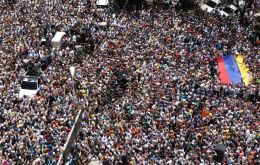
After weeks of power cuts and limited access to water, tens of thousands of Venezuelans took to the streets on Saturday to back opposition leader Juan Guaido and protest against President Nicolas Maduro, who they accuse of wrecking the economy.
-
Saturday, April 6th 2019 - 09:55 UTC
Venezuelans protestors and government supporters take to the streets nationwide on Saturday
![“The call [to protest] is for April 6, across the country is not just a protest to reject the situation we are going through but for a definite end to the usurpation”](/data/cache/noticias/69631/260x165/guaido.jpeg)
Venezuelans are expected to take to the streets nationwide on Saturday, less than a week after power outages left many without basic services and water. US-backed opposition leader Juan Guaido, who declared himself interim president in late January, called on his supporters to gather in the capital Caracas and different areas around the country to protest against President Nicolas Maduro and the “tragic” conditions plaguing the country.
-
Wednesday, April 3rd 2019 - 19:15 UTC
Guaidó after the strip of his immunity: “Nothing is going to stop us”; leaders ask for military intervention
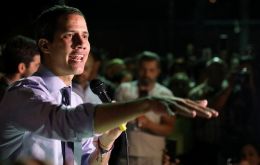
The ruling National Constituent Assembly (ANC) decided to withdraw parliamentary immunity to the opposition leader, President of the National Assembly (AN) and declared interim President of Venezuela, Juan Guaidó, who affirmed that nothing will stop him by ensuring that “there is no need to respond to an organism that does not exist. ” Opposition leaders expect to activate an article of the constitution that allows the AN to authorize a foreign military intervention in the country in order to withdraw “illegitimate” President Nicolás Maduro.
-
Tuesday, April 2nd 2019 - 09:51 UTC
Maduro's regime strips Guaido of immunity; Venezuela remains with no power
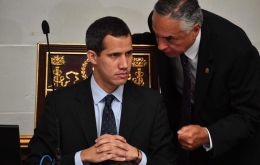
Venezuela's chief justice asked lawmakers on Monday to strip opposition leader Juan Guaido of immunity, taking a step toward prosecuting him for alleged crimes as he seeks to oust President Nicolas Maduro.
-
Monday, April 1st 2019 - 08:20 UTC
Venezuela collapses: no power, water or internet; Schools suspended, workday limited to 02:00 PM
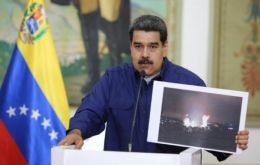
Venezuela’s President Nicolas Maduro announced 30 days of electricity rationing on Sunday, after his government said it was reducing the length of the workday and keeping schools closed due to devastating blackouts plaguing the country.
-
Sunday, March 31st 2019 - 17:07 UTC
Venezuela suffers the fifth mass blackout of the month
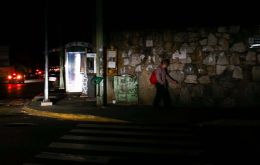
A new massive blackout was recorded this weekend in Venezuela after a nationwide interruption of electricity service this Friday, which was slowly restored in main cities as Caracas. However, a new relapse of the supply occurred on Saturday night, affecting 16 states of the country - more than half.
-
Saturday, March 30th 2019 - 08:30 UTC
Red Cross ready to supply humanitarian aid to Venezuela, apparently negotiated with Maduro's regime
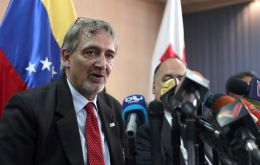
The International Federation of the Red Cross and Red Crescent Societies said on Friday it was prepared to channel humanitarian aid to Venezuela through an operation that could be similar to one in Syria, potentially helping ease chronic hunger and disease in the South American nation. President Nicolas Maduro in February blocked efforts by political opponents to bring US-backed aid into the country across its borders with neighboring Colombia and Brazil, and has denied the country is suffering a humanitarian crisis.
-
Friday, March 29th 2019 - 08:30 UTC
Guaidó barred from holding office for 15 years, says Comptroller from Maduro's regime
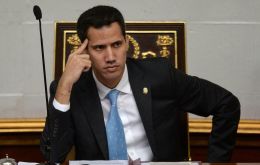
Venezuelan opposition leader Juan Guaidó will be barred from holding further public office for 15 years, the maximum allowed by law, the state financial controller has announced. Comptroller Elvis Amoroso said Mr Guaidó's personal financial statements contained inconsistencies.
